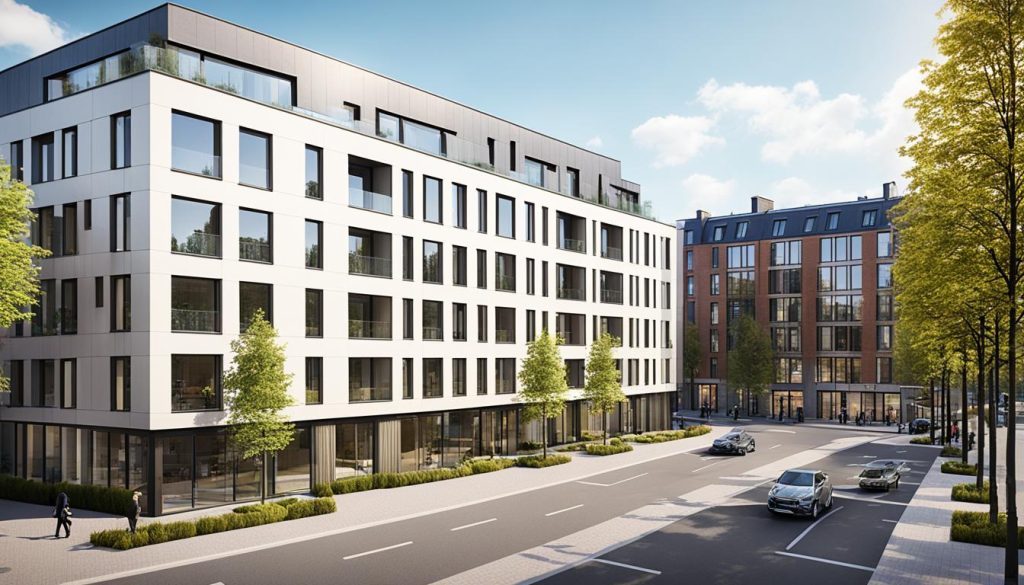Welcome to our guide on the Belgian real estate market for 2023. We will share valuable insights and analysis. This includes the current market state, trends, and what to expect in the future.
Are you looking for investment chances or thinking of buying a home? Or maybe you’re curious about the Belgian real estate world. This article is for you, offering a full view.
We will cover residential and commercial real estate, key market influencers, and the laws. This includes economic factors and the impact of location.
There’s more. We’ll talk about investing opportunities, green efforts in real estate, and how COVID-19 has affected the market.
You will also get to know the ins and outs of buying property in Belgium. This includes renting rules and luxury properties for the wealthy.
Plus, we will look at money matters. We’ll see how to finance your property buy in Belgium.
Finally, we end with future market trends, forecasts, and expert advice on the Belgian real estate market.
Let’s explore the exciting world of Belgian real estate together. Discover the insights needed for wise decisions in 2023.
Understanding the Belgian Real Estate Market
Understanding the Belgian real estate market is key for both investors and homebuyers. We’ll look at its geographical layout, laws, and economic factors. These all play a big role in shaping this market.
Geographical Layout
The market is split into Flanders, Wallonia, and Brussels-Capital. Each area has its own effects on prices and demand. Flanders is in the north and has lively cities like Antwerp and Bruges. Wallonia, to the south, boasts beautiful countryside and a quieter life. Then there’s the Brussels-Capital Region, home to the lively city of Brussels.
Legislative Framework
The laws in Belgium’s real estate market keep things fair for all involved. They ensure contracts and rights are legally solid. The buying and selling of property is well-structured. The notarial system watches over transactions to make sure they’re legal.
Economic Indicators
The real estate market and Belgium’s economy go hand in hand. Things like GDP and employment rates shape property values. Belgium stands out in Europe for its steady economy. Plus, low rates and good mortgage deals make it a good place for buyers and investors.
| Key Factors | Impact on Market |
|---|---|
| Economic growth | Affects demand for properties and rental prices |
| Population growth | Influences housing demand and development |
| Government regulations | Shapes property taxes, zoning, and urban development |
| Infrastructure investment | Enhances accessibility and attractiveness of certain areas |
Knowing about the market’s layout, laws, and economy helps buyers and investors. It allows them to make smart choices and move through the market confidently. Upcoming sections will cover trends, investing tips, and legal points. We aim to give a full guide for those looking at Belgium’s real estate market.
Residential Property Trends in Belgium
The residential property market in Belgium is always changing. It’s influenced by many trends and dynamics. Whether you’re looking to buy, invest, or just curious, knowing the latest trends is important. We’ll look at the key trends, like housing prices and the types of properties available.
Housing Prices
In recent years, housing prices in Belgium have gone up a lot. This shows that more and more people want to buy homes. But, these price increases are not the same everywhere. Places like Brussels and big cities see prices rise more than smaller towns. It’s smart to keep track of prices in the area you’re interested in.
Property Types
Belgium’s property market has many types of homes for different budgets and tastes. You can find everything from apartments to villas. Usually, cities have more apartments, while suburbs and rural areas have more houses. So, there’s something for everyone.
Demand-Supply Dynamics
It’s key to understand who wants to buy homes and why when thinking about investing. In Belgium, many people are looking for affordable homes in cities. This high demand is because more people are moving to cities and lifestyles are changing. But, there’s not enough affordable housing to meet this demand. This lack of supply can create good chances for investments.
Rental Market
The rental market is a big part of Belgium’s property sector. In urban areas, many choose to rent because buying can be very expensive. There are apartments, houses, and more available for renting, fitting various budgets. It’s also important to know the rules and rights of renting before you start.
Sustainable Housing
More and more people want homes that are good for the environment. In Belgium, you can find homes with solar panels, green roofs, and energy-saving appliances. These features help the country lower its carbon footprint and promote green development.
To make good decisions in Belgium’s property market, staying informed is key. Next, we’ll look at the commercial real estate sector in Belgium. We’ll see the different properties available and the role of foreign investment.
Commercial Real Estate in Belgium
The market for commercial real estate in Belgium is full of great chances for investors. Its position in Europe, solid economy, and business-friendly setting attract local and global businesses. Here, we’ll look at the different commercial properties in Belgium and how foreign investment impacts them.
Office Spaces
Belgium’s cities, like Brussels and Antwerp, have many modern office spaces for any type of business. You can find everything from shared offices to big company headquarters. As remote work and flexible office solutions become more popular, the office market is evolving to meet these needs.
Retail Properties
The retail industry in Belgium is lively, with a mix of local, international, and well-known brands. The shopping streets in cities like Brussels and Antwerp are always busy. Investors can choose from high-traffic street locations or shopping centres, providing a variety of consumer choices.
Industrial Sites
Belgium’s spot in Europe makes its industrial real estate market very important. Its strong logistics and transport systems help move goods across Europe. Warehouses, distribution centres, and manufacturing sites are in great demand, attracting investors from home and abroad.
Foreign Investment
Foreign investors are key players in Belgium’s commercial real estate scene. Many use Belgium as a starting point for the European market. The country’s tax benefits, skilled workers, and political stability add to its appeal for these businesses.
Key Figures in the Belgian Commercial Real Estate Market
| Commercial Real Estate Segment | Key Figures |
|---|---|
| Office Spaces | Occupancy Rate: 89% | Prime Rent per Square Meter: €300 per month |
| Retail Properties | Average High-Street Rents: €1,000 per square meter per year | Shopping Center Vacancy Rate: 6.8% |
| Industrial Sites | Prime Warehouse Rents: €55 per square meter per year | Logistics Occupancy Rate: 93% |
| Foreign Investment | Annual FDI Inflows: €10 billion | Top Investor Countries: France, Netherlands, Germany |
Belgium’s real estate market is a great place for investors seeking steady returns and growth. There’s something for everyone, from offices and shops to industrial spaces.
Investment Opportunities in the Belgian Property Market
The Belgian property market is full of chances for those wanting to make the most of the booming real estate scene. It doesn’t matter if you’re new to investing or have years of experience, Belgium has something for everyone. You can find different types of properties that suit your goals and tastes.
Buy-to-Let Properties
Buying properties to rent out is a favourite choice here. There’s a strong need for rental homes all over Belgium. This means you can get a reliable income by buying and renting out places. Cities like Brussels are great for this because lots of people want to live in these international hotspots.
Student Housing
Investing in rooms or flats near universities is a smart move. Students are always looking for places to stay. This guarantees you a regular income. Plus, the value of your property might go up over time. It’s a win-win for your pocket and your investment.
Short-Term Rentals
Thanks to Airbnb and similar platforms, renting flats or houses for short stays is a growing field. Places in popular tourist spots or busy business areas do really well. Brussels, Bruges, and the coast are top picks for this. They can bring in a good income from short stays.
When looking at investments in the Belgian market, think about what you want and study the market. Knowing about the demand and what you can get back from your investment is key. It helps you choose wisely and get the most out of the dynamic Belgian property scene.
| Investment Opportunity | Key Features | Location | Expected Returns |
|---|---|---|---|
| Buy-to-Let Properties | Steady rental income | Brussels, Antwerp | 4-6% annual rental yield |
| Student Housing | Consistent demand near universities | Leuven, Ghent | 5-8% annual rental yield |
| Short-Term Rentals | Flexible rental income | Bruges, Belgian Coast | 10-15% annual rental yield |
Sustainable Development in Belgian Real Estate
The Belgian real estate market is changing for the better. More people are seeing the importance of caring for the environment. This includes using methods that help our planet stay healthy for the long run.
One major change is the focus on creating green buildings. These structures are designed to save energy and reduce harm to the environment. By using the latest technology and building materials, they cut down on energy use and harmful gases. This doesn’t just protect our planet. It also saves money for those who own and use the properties.
Making buildings more energy efficient is key in the Belgian real estate world. By adding insulation and modern heating and cooling systems, as well as using green power, we can lower our impact on the planet. These changes also make homes and offices more comfortable.
Benefits of Sustainable Development in Belgian Real Estate
| Benefits | Description |
|---|---|
| Environmental Impact | Reduced carbon emissions, conservation of natural resources |
| Cost Savings | Lower utility bills, long-term financial sustainability |
| Enhanced Property Value | Increased demand and market appeal for sustainable properties |
| Improved Quality of Life | Better indoor air quality, comfortable living and working spaces |
Green efforts also aim at whole communities in Belgium. City planning encourages eco-friendly designs. This includes more pathways for walking, green areas, and easy access to public transport. Such plans make cities healthier and more inviting for everyone.
The move towards green real estate offers a win for all involved. It is in line with the global fight against climate change. Plus, it brings many good things like saving money, higher property prices, and better places to live and work.
The push for green buildings is growing. It’s a big chance for profit, for happiness and for keeping our planet in good shape. It’s important for all in the real estate field to work this way. This ensures Belgian real estate has a bright, green future.
Impact of COVID-19 on the Belgian Property Market
The COVID-19 pandemic deeply affected the Belgian property market. The world fought the virus’s effects. This changed many things, such as what buyers looked for, work settings, and tech’s role in buying.
Buyers now want homes that promote health and well-being since COVID-19 hit. They aim for places with more space, outdoor features, and close to nature. So, properties that offer comfort and meet these new needs are popular.
More people now work from home because of the pandemic. This made homes with offices or spots for remote work more wanted. Since many firms now allow remote work, buyers looked for homes that could also meet their work needs.
Technology changed how property deals were made in Belgium during the pandemic. People started using virtual tours, online listings, and handled legal work remotely. This allowed the market to keep going safely. This tech trend is expected to keep growing, making tech key in buying homes.
To understand more about COVID-19’s effect on the Belgian property market, we should explore how buyer preferences, working from home, and tech have changed the real estate scene.
Changes in Buyer Preferences:
- More demand for homes with open spaces and outdoor features.
- Buyers favour homes that promote health and well-being.
- Interest has grown in homes near nature and fun spots.
Remote Work Trends:
- More want homes with offices for remote work.
- Businesses supporting remote work have changed homebuyer views.
- How and where people work now influences home buying choices.
Role of Technology:
- Virtual home tours and online listings are now very liked.
- Online legal work and remote deals are now common.
- Tech helped make buying homes easier during the pandemic.
COVID-19’s impact on the Belgian property market has led to changes in what buyers want, how work is done, and the adoption of technology. As we see more effects from the pandemic, it’s key for buyers, sellers, and experts to keep up and be flexible in the real estate world.
| Impact Factors | Description |
|---|---|
| Buyer Preferences | Focus now on homes with open areas, outside features, and connection to nature |
| Remote Work Trends | Now want homes with spaces to work from or set up for remote jobs |
| Role of Technology | Virtual tours, online listings, and remote deal-making are now usual |
Regions to Watch in the Belgian Real Estate Market
The Belgian real estate market is thriving, with hotspots appearing for investment and growth. These areas offer unique chances that meet various investor needs and buyer wishes.
1. Brussels
As the capital of Belgium and the heart of EU politics, Brussels pulls in a lot of interest. Its diverse economy, cultural sites, and connections draw investors and buyers. You’ll find both homes and shops here, which suits everyone from individuals to big companies.
2. Antwerp
Antwerp shines with its fashion and diamond scene, making it a top pick for real estate. Its ideal spot, busy port, and creative industry help its popularity grow. You can choose from many types of properties, from homes to offices and industrial spaces.
3. Ghent
Ghent’s old-world charm and student buzz are catching investors’ eyes. The city is becoming a tech and research hub, pulling in new businesses. As a result, there’s a rising need for homes to rent, creating a good market for investors.
4. Bruges
Bruges’ UNESCO sites and pretty canals make it a tourist favourite. This tourism boosts the need for holiday homes, offering a chance for investment. It’s a good choice for those wanting to join the tourism venture.
5. Leuven
Leuven is known for having Europe’s oldest university and a strong research community. This turns it into a hotspot for student homes, offering a special market for investors. It’s a great place for those focusing on student living.
6. Mechelen
Mechelen sits between Brussels and Antwerp, offering a mix of low prices and growth potential. Its old town and rebounded culture scene attract young professionals and families. They’re looking for cheaper homes near big cities.
There’s more to discover in the Belgian real estate market beyond these regions. Each area has its special chances and benefits, fitting various investment types and buyer tastes. By learning about these places and exploring the market, investors can have a good shot at succeeding in Belgium.
Financing Options in the Belgian Property Market
Investing in the Belgian property scene means looking at the various ways to finance. If you’re expanding your investment list or finding your perfect home, knowing your financial options is key. This knowledge will guide your choices wisely.
1. Mortgages
One primary way to finance property in Belgium is through a mortgage. Different banks and finance firms have mortgage plans tweaked for varied needs. Borrowers can pick between fixed and adjustable rates, finding the best fit for their future financial plans.
2. Loans
Loans are common for those buying property in Belgium. Be it for personal or business use, loans provide the capital for investing. But, it’s crucial to study interest rates, the time you have to pay back, and who can actually get these loans before deciding.
3. Government Initiatives
In Belgium, the government also adds incentives to own property and boost the market. These include subsidies, tax cuts, and benefits to help both individuals and businesses. By qualifying for these programs, you can lessen the money pressure of buying a property.
Not all financing methods are the same. Each has its own benefits and things to think about. By talking to financial specialists familiar with the Belgian market, you can find the right plan for you.
| Financing Options | Pros | Cons | |
|---|---|---|---|
| 1 | Mortgages | – Fixed or adjustable rates – Long repayment terms – Potential tax benefits |
– Stringent eligibility criteria – Interest rate fluctuations – Additional fees and charges |
| 2 | Loans | – Flexibility in loan amounts – Quick access to funds – Can be used for various purposes |
– Higher interest rates for unsecured loans – Limited loan repayment options – Potential impact on credit score |
| 3 | Government Initiatives | – Financial incentives – Reduced costs – Support for first-time buyers |
– Eligibility restrictions – Limited availability – Compliance with program requirements |
Legal Considerations for Buying Property in Belgium
Buying property in Belgium involves understanding important legal aspects. It’s key for a smooth purchase. We will outline key legal points buyers should know.
Contract Agreements
The contract agreement is key when you buy a property in Belgium. It shows the terms, price, and special conditions. Always check the contract and get legal advice. Having a good notary’s help during the process is very smart.
Notary Services
Notaries in Belgium are crucial for property deals. They ensure the sale is legal and handle important paperwork. It’s essential to work with a skilled notary to avoid issues.
Tax Obligations
Bought property in Belgium has tax duties. These taxes vary and can include several types. Talk to a tax expert to know your tax duties and plan your budget.
Other Legal Considerations
Zoning rules, permits, and property restrictions are important. Do your homework and get advice to spot and solve any legal problems before buying.
Keep these legal points in mind to buy a property in Belgium wisely. Working with experts like notaries, lawyers, and tax advisors ensures a correct and hassle-free process.
| Legal Considerations | Buying Property in Belgium |
|---|---|
| Contract Agreements | Reviewing and understanding the terms and conditions of the contract agreement |
| Notary Services | The role of notaries in property transactions and the importance of working with a reputable notary |
| Tax Obligations | Awareness of the various taxes associated with buying property in Belgium |
| Other Legal Considerations | Zoning regulations, planning permissions, building permits, and potential restrictions or easements |
Renting in Belgium: Regulations and Tenant Rights
Understanding rental regulations and tenant rights in Belgium is key for both landlords and tenants. It ensures a smooth renting experience for everyone involved.
Lease Agreements
In Belgium, a written lease contract is a must for both tenants and landlords. This contract details the tenancy, including the rent, the duration, and any extra conditions. It’s important to read this document closely and get legal advice if needed.
Rent Control
Belgium operates a rent control system. This means landlords cannot raise the rent without limits. Normally, rents only go up once a year following the Consumer Price Index (CPI). However, they can push for more rent if they’ve carried out major renovations.
Security Deposits
Tenants in Belgium must pay a security deposit when renting. For a furnished place, this can be up to three months’ rent. For unfurnished, it’s capped at two months’ rent. Landlords have two months after the end of the tenancy to return it, after any deductions.
Dispute Resolution
When there’s a problem, tenants and landlords can try mediation or arbitration to sort it out. If that doesn’t work, it might go to court. Getting advice from real estate lawyers can help reach a fair solution.
Renters’ Associations
Renters in Belgium can turn to renters’ associations for advice and support. They help with tenant rights, advice in disputes, and navigating the rental market. Joining one can offer a sense of community and support.
Overview of Tenant Rights and Responsibilities in Belgium
| Tenant Rights | Tenant Responsibilities |
|---|---|
| – Right to a written lease agreement | – Pay rent on time |
| – Right to a properly maintained property | – Report any damages or repairs needed |
| – Right to a fair rent and rent increase | – Respect the property and its neighbors |
| – Right to privacy | – Abide by the terms of the lease agreement |
| – Right to dispute resolution | – Give proper notice when terminating the lease |
Knowing the rules and your rights is vital for renting in Belgium. It protects you and helps build a good relationship with your landlord.
Luxury Real Estate in Belgium
Belgium is a top place for luxury real estate. It meets the needs of rich buyers. They look for exclusive, high-end, and stylish living spaces. The country’s cities, nature, and culture make a great setting for luxury homes. These homes show elegance and top quality.
From big old mansions in Brussels to beautiful villas in Bruges, there’s a lot to choose from. Belgium’s real estate market has many types of homes. They show off amazing architecture and design. These homes come with top-notch features, stunning views, and great comfort. They’re all about living the good life.
Exclusive Properties
Belgium has many special homes for different tastes. You might want a luxury penthouse in the city. Or maybe a big country estate fits your style better. In Belgium, there’s something for everyone when it comes to dream homes.
Luxury Amenities
Belgium’s luxury homes have more than just beautiful design. They also have top amenities. Fancy gyms, private spas, wine cellars, and movie rooms are common. They also offer awesome outdoor spaces. These extras make living there a real luxury.
Affluent Buyer Demand
Rich buyers from everywhere love Belgium’s luxury homes. Its stable economy and great places to live are big draws. Plus, its spot in Europe makes it easy for global citizens to visit their second homes. This keeps the demand for luxury homes high in Belgium.
Belgian Cities with Prominent Luxury Real Estate Markets
| City | Key Features |
|---|---|
| Brussels | Grand historic mansions, luxury apartments, proximity to international institutions |
| Antwerp | Stylish penthouses, trendy waterfront properties, renowned fashion and diamond industry |
| Bruges | Charming canal-side residences, historic townhouses, UNESCO World Heritage Site |
| Ghent | Converted industrial buildings, canal-front properties, vibrant cultural scene |
| Knokke-Heist | Exclusive beachfront villas, luxury apartments, seaside resort town |
Betting on luxury real estate in Belgium is a chance to have a top property. The country is known for its high living standards and culture. Plus, its beautiful architecture adds to the appeal. Whether it’s your main home or part of your investment, Belgium’s luxury homes offer style, class, and a great way of living.
Real Estate Market Outlook: Projections and Forecasts
In this part, you’ll find out what may happen in the Belgian real estate market by 2023. We got advice from experts and checked important signs in the market.
Residential Property Market
The future looks bright for the housing market in Belgium in 2023. Housing is still in high demand, and the economy is growing steadily. This should lead to prices going up a bit all over. Keep in mind, though, some places might see bigger jumps than others.
Commercial Real Estate Sector
Better days are on the way for business property in Belgium in 2023. With the economy picking up and new ways of working, people will need more office space. This is especially true in big cities like Brussels and Antwerp. Shops and industrial areas should also do well as people start feeling more sure about spending.
Investment Opportunities
It looks like a good year for investing in Belgian property in 2023. Renting out, especially to students and for short stays, could bring in good money. Plus, eco-friendly places are becoming more popular, offering a chance for green-minded investors.
The Impact of COVID-19
COVID-19 changed things for the property market in Belgium, but better days are coming. As more people get the vaccine and travel gets easier, we should see things get back to normal. The way we work, with more people working from home, is affecting what buyers want. They’re looking for more space and a place to work at home.
Regional Outlook
Though there’s generally good news for Belgian real estate, not all places are the same. Areas like Flanders, with cities such as Ghent and Bruges, are growing fast. They offer good chances for investment. Even Wallonia, home to cities like Liège and Namur, has its attractive points for investors.
On the whole, 2023 looks to be a year where both buyers and investors can do well in Belgium’s real estate market. The market’s ability to change and the steady demand for property make Belgium a good place for real estate business.
Tips for Investing in the Belgian Real Estate Market
Investing in the Belgian real estate market can bring good returns. It is a smart move for those wanting to increase their wealth and ensure financial security over the long term. For both experts and beginners in real estate, these tips will offer guidance. They aim to help you understand the Belgian market better and make wise investment choices.
1. Conduct Thorough Market Research
Before investing, it’s crucial to research the Belgian real estate market well. Learn about market trends, values of properties, and the demand for rentals in different areas. Working with a local agent or consultant can be very useful. They can offer insights and help you spot good investment chances.
2. Diversify Your Portfolio
Reducing risk through diversification is a wise choice. Instead of focusing on just one property type, mix things up. Invest in different properties like houses, offices, or luxury estates. This strategy can help reduce the effects of market changes and increase your profits.
3. Consider the Location
A property’s location greatly affects its value and rental income. Find properties in areas with growing economies and good facilities. Also, look for places near schools, stores, and transport. Keep an eye out for areas that are developing. They may have higher property values soon.
4. Assess Rental Demand
If you plan to rent out your property, check the area’s rental demand first. Pick locations where properties don’t stay empty for long and people want to live. Consider population changes, job opportunities, and student numbers. These factors suggest there will be a strong demand for rentals.
5. Get Familiar with Legal and Tax Regulations
Real estate investments come with legal and tax requirements. Understanding Belgium’s property and rental laws is a must. It’s advisable to talk to a legal or tax expert in Belgian real estate. They can help ensure you follow the rules and save on taxes.
6. Evaluate Potential Risks
All investments involve some level of risk, including real estate. Think about risks like market ups and downs, changing interest rates, and repair costs. Have a backup plan and keep some money set aside for emergencies. This will help protect your investment.
7. Network with Local Professionals
A strong professional network can be a goldmine of information and support. Make connections with real estate agents, lawyers, and property managers. Join events and associations. Also, mingle with other investors. This networking can improve your knowledge and chances of success.
8. Stay Updated on Market Trends
The real estate market is always changing. Keep up with new trends, economic news, and legal updates that affect the Belgian market. Subscribing to newsletters and following real estate blogs can keep you informed. Continuous learning will help you make smart investment decisions.
| Tips for Investing in Belgian Real Estate Market |
|---|
| Conduct Thorough Market Research |
| Diversify Your Portfolio |
| Consider the Location |
| Assess Rental Demand |
| Get Familiar with Legal and Tax Regulations |
| Evaluate Potential Risks |
| Network with Local Professionals |
| Stay Updated on Market Trends |
Conclusion
The Belgian real estate market looks good for 2023. It shows many chances for investors and buyers. Both residential and commercial properties have interesting options.
Investors can choose from many types of properties in Belgium. There’s buy-to-let, student housing, and short-term rentals. Also, there’s a big focus on green buildings. This is great for those wanting to invest in eco-friendly homes.
Even with COVID-19 challenges, Belgium’s market is strong. It’s changed to meet what buyers want and uses new tech. Many areas are growing fast. Plus, Belgium has good laws on real estate and offers many ways to pay for a property.













